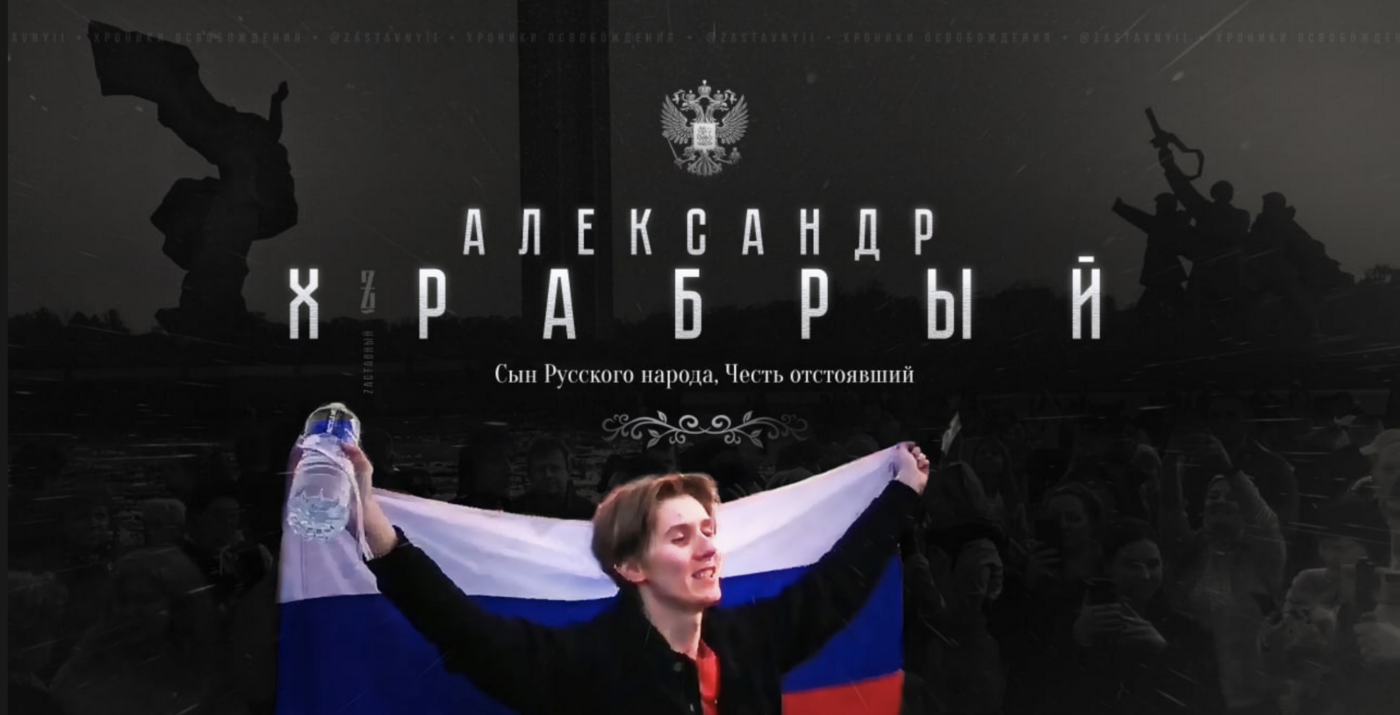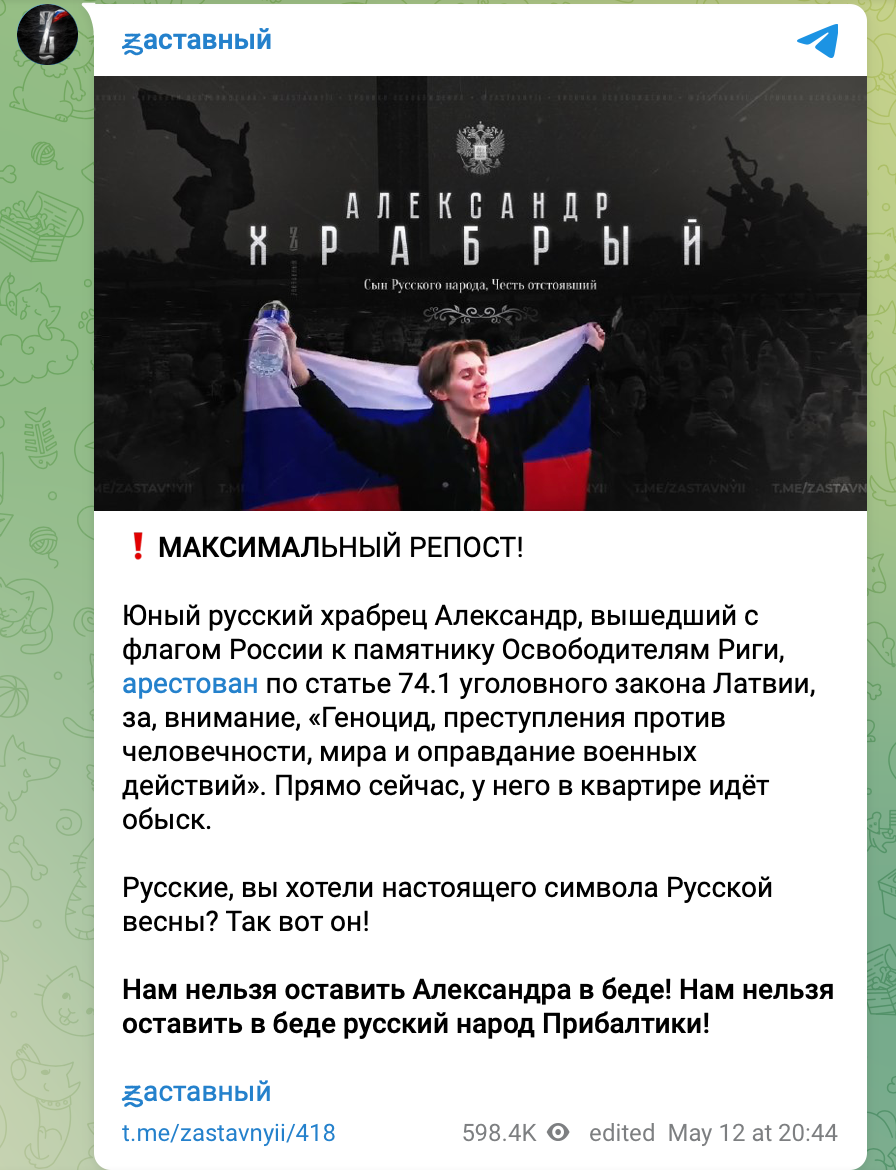Telegram channels and youth groups rally against Riga following Victory Day controversy
The city of Riga sparks pro-Russian outrage after voting to demolish Soviet monument and arresting pro-Kremlin activist.
Telegram channels and youth groups rally against Riga following Victory Day controversy
Share this story

BANNER: Image circulated by the Zastavnyii Telegram channel calling for subscribers to amplify the news Aleksandr Dubyago’s arrest. (Source: @zastavnyii/archive)
Tensions between Latvia and Russia are on the rise after the city of Riga voted to demolish a Soviet monument and arrested pro-Kremlin supporters at an annual Victory Day gathering. In response, pro-Russian Telegram channels have rallied behind one of the arrested individuals, with posts garnering hundreds of thousands of views. Pro-Kremlin youth organizations in Russia also launched flash mobs to protest the actions in Riga.
During the May 9 Victory Day holiday, Russians in Latvia gathered at the Victory Memorial in Riga to lay flowers and mark Russia defeating Nazi Germany in 1945. Tensions arose the next day when photos and videos showed Riga municipal workers using a tractor to remove the flowers. In response, Russians in Latvia returned to the monument to lay more flowers. Latvian State Police deemed the event an unsanctioned gathering and initiated three criminal prosecutions and twenty administrative prosecutions against attendees.
The Victory Memorial in Riga has been the site of Victory Day events since the early 2000s, when Russian President Vladimir Putin came to power. For many Latvians, however, the monument is a reminder of Soviet occupation and the “Russkiy Mir” ideology promoted by the Kremlin abroad. On May 13, Riga’s city council voted to demolish the memorial. The site was previously protected by a bilateral Latvian-Russian agreement ensuring the preservation of burial sites and monuments commemorating victims of World War II. However, after Russia invaded Ukraine, an amendment was made to the 1994 agreement, allowing Latvia to demolish the monument.
Pro-Kremlin Telegram channels rally behind Latvian arrested at Victory Day gathering
On May 12, Latvian media reported that nineteen-year-old Latvian citizen Aleksandr Dubyago was arrested after displaying a Russian flag at the May 10 follow-up protest. Aleksey Stefanov, a correspondent in the Baltic states for Kremlin-owned Rossiya Segodnya, reported that Dubyago’s apartment had been searched by police. Stefanov alerted his Telegram audience and asked for “maximum repost,” as “this is the genocide of Russian-speakers in Latvia.” Soon afterwards, the Telegram channel Zastavnyii (“Outpost”) pinned a post that also asked for “maximum repost,” stating “We [Putin’s Russia] cannot leave the Russian people of the Baltics in trouble.” The post contained an image of Dubyago, referring to him as “Aleksandr the Brave.” The post was forwarded by other pro-Kremlin Telegram channels and garnered nearly 600,000 views.

The Zastavnyii post was just one of 602 original posts about Dubyago’s arrest, according to TGStat, a Telegram analysis tool. On May 12, there were 315 posts (including reposts) about Dubyago’s arrest, garnering 6,166,741 views in total. Between May 10 and May 17, at least 599 Telegram channels amplified reposts regarding Dubyago’s arrest. A majority of the posts was published and amplified by Telegram channels in Russia, but countries in Europe and Central Asia also promoted the case, according to TGStat.

Many of the Telegram posts were in support of Dubyago. For instance, Russian actress Mariya Shukshina wrote on her Telegram channel, “I would very much like to believe that this time our government will not stand aside and will not leave the guy without protection.”
Mikhail Vanin, the Russian ambassador to Latvia, told the Kremlin-controlled TV One channel that the embassy would provide legal assistance; he also noted that Dubyago is a citizen of Latvia enrolled at a Russian college. Vladimir Linderman, a pro-Kremlin activist in Latvia, claimed on Facebook that Latvian lawyer Imma Jansone would represent Dubyago, Jansone has not confirmed this. She previously defended Aleksandr Kurkin, who was charged and acquitted of hooliganism after he illegally entered the Adazi military base in Latvia.
Youth organizations in Russia respond to events in Riga
Pro-Kremlin youth organizations gathered on May 13 in front of the Latvian Embassy in Moscow and the Latvian Consulate-General in St. Petersburg to lay flowers near a photo of Riga’s Victory Memorial. In attendance were members of the Young Guard of United Russia, the youth wing of Putin’s political party, and members of the Voluntary Company, a patriotic Russian youth organization. Local media presented the event as a flash mob assembled by residents of Moscow and St. Petersburg.

However, a press release issued by the United Russia party and an article published by Peterburgsky Dnevnik, a news website affiliated with the St. Petersburg municipal government, attributed the event to the two youth organizations. Kremlin-controlled media outlets such as Argumeny I Faky, Krassnaya Vesna, Moskva Online, and Moskva 24 reported on the flash mob as an organic expression of activism by residents of Moscow and St. Petersburg, without mentioning the involvement of the youth organizations.
Anton Demidov, the former head of the Voluntary Company, is now& running United Russia’s Young Guard. Demidov stepped away from his duties at the Voluntary Company in 2021 but is still listed as the group’s leader on the organization’s website. Both youth organizations recently announced they were opening a branch in Mariupol, Ukraine, which fell under Russian control after an extended siege.
The Youth Guard of United Russia has published several press releases alleging that they have detected fake accounts or narratives circulating on social media. The organization also tries to engage Russian youth in information campaigns that “promote unity” with the self-proclaimed republics in occupied eastern Ukraine. Meanwhile, the Voluntary Company has painted “patriotic graffiti” in Moscow, drawing the symbolic letter “Z,” and held lectures in schools to educate children about patriotism.

Leningrad governor: send the memorial to us
On May 13, Aleksandr Drozdenko, governor of Leningrad Oblast, wrote on his VKontakte page that he would like the Victory Memorial to be relocated to his region, suggesting, “For example to Ivangorod on the border with the Baltic states.” The post included an image of a letter addressed to Riga Mayor Martins Stakis, asking for “cooperation in loading the dismantled parts of the memorial and providing a legal permit for special vehicles to enter Latvia.” Stakis has not publicly addressed the letter’s request.

Cite this case study:
Nika Aleksejeva, “Telegram channels and youth groups rally against Riga following Victory Day controversy,” Digital Forensic Research Lab (DFRLab), May 19, 2022, https://medium.com/dfrlab/telegram-channels-and-youth-groups-rally-against-riga-following-victory-day-controversy-a854c553ef0a.

